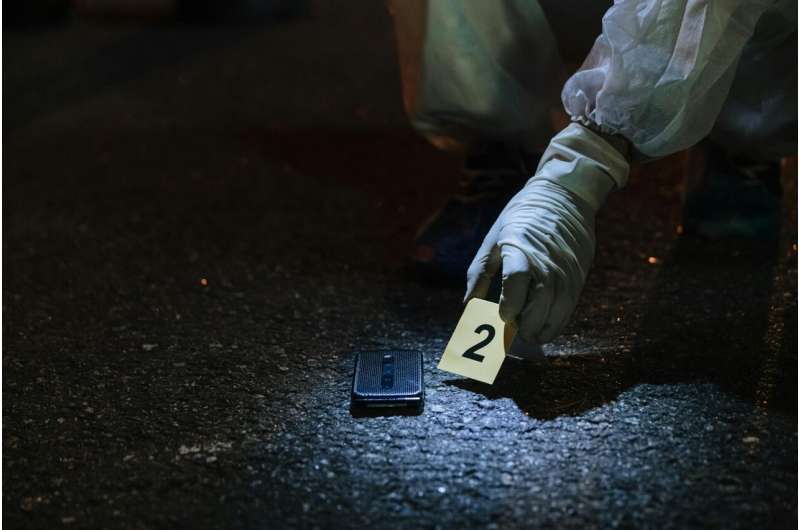Science
Study Reveals Impact of Stress on Forensic Services Staff

Research from Griffith University has highlighted the significant impact of organizational and occupational stress on staff working in forensic services. Published in the Journal of Forensic Sciences on November 11, 2025, the study sheds light on how these stressors affect the well-being of police personnel who engage with distressing material while examining crime scenes and analyzing evidence.
Dr. Jacob Keech, from Griffith’s School of Applied Psychology, emphasized the need to broaden the focus of police agencies. While much attention has been given to trauma exposure, their research aimed to identify how various organizational demands influence the well-being of forensic staff. This approach seeks to uncover workplace resources that can mitigate stress and prevent burnout.
The findings revealed that factors such as bureaucratic inefficiencies, unequal workloads, and excessive administrative tasks were significant contributors to stress. Dr. Keech pointed out, “Examples of organizational stressors included unequal sharing of work responsibilities, bureaucratic red tape, and excessive administrative duties.” Additional stressors identified included working alone at night and the inherent risks of the job, including shift work.
Despite the common belief that trauma exposure is the primary cause of burnout and distress among forensic staff, the research indicated that organizational pressures were the strongest predictors of adverse well-being outcomes. Many staff members reported feeling overwhelmed by administrative obligations, fearing they might let their team down due to their work pace. They expressed concerns about their ability to conduct thorough investigations, struggle with achieving a work-life balance, and worry about the competence and motivation of their colleagues.
Conversely, the study identified several protective factors that can enhance well-being. Supportive supervisors, peer assistance, and a strong psychosocial safety climate—where staff feel valued by their organization—were linked to lower levels of burnout and higher job satisfaction and engagement.
Dr. Keech highlighted the necessity for a holistic approach to improve the well-being of police staff in forensic services. He stated, “Police agencies should focus on reducing organizational and administrative strain, building a psychosocial safety climate where well-being is prioritized across all levels of management, and uplifting supervisor and peer support capacity.”
As part of this initiative, Dr. Keech and Associate Professor Jacqueline Drew have developed the EMPOWER Leaders Program. This program aims to enhance the capability of mid-level police leaders to improve their own health and that of their staff, ultimately fostering a healthier work environment.
This research is crucial in guiding police agencies toward creating a more supportive atmosphere for their forensic teams, ensuring that their well-being is prioritized amidst the challenges they face in their roles. The findings underscore the need for systemic change in how stress is managed within these specialized units, paving the way for more effective support mechanisms.
-

 Lifestyle4 months ago
Lifestyle4 months agoLibraries Challenge Rising E-Book Costs Amid Growing Demand
-

 Sports3 months ago
Sports3 months agoTyreek Hill Responds to Tua Tagovailoa’s Comments on Team Dynamics
-

 Sports4 months ago
Sports4 months agoLiverpool Secures Agreement to Sign Young Striker Will Wright
-

 Lifestyle4 months ago
Lifestyle4 months agoSave Your Split Tomatoes: Expert Tips for Gardeners
-

 Lifestyle4 months ago
Lifestyle4 months agoPrincess Beatrice’s Daughter Athena Joins Siblings at London Parade
-

 World3 months ago
World3 months agoWinter Storms Lash New South Wales with Snow, Flood Risks
-

 Science4 months ago
Science4 months agoTrump Administration Moves to Repeal Key Climate Regulation
-

 Science3 months ago
Science3 months agoSan Francisco Hosts Unique Contest to Identify “Performative Males”
-

 Business4 months ago
Business4 months agoSoFi Technologies Shares Slip 2% Following Insider Stock Sale
-

 Science4 months ago
Science4 months agoNew Tool Reveals Link Between Horse Coat Condition and Parasites
-

 Sports4 months ago
Sports4 months agoElon Musk Sculpture Travels From Utah to Yosemite National Park
-

 Science4 months ago
Science4 months agoNew Study Confirms Humans Transported Stonehenge Bluestones









